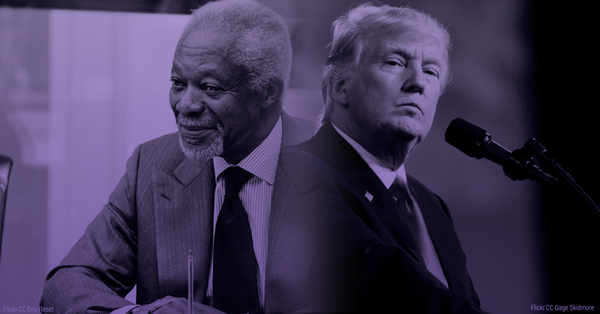What Kofi Annan learnt about drugs that Trump seems to ignore...
The Global Commission on Drug Policy has just published a new report on Regulation: The Responsible Control of Drugs, providing an invaluable contribution to break the taboo on a challenging subject and pointing the way out of decades of damaging and counterproductive prohibition-based drug policies that have failed to reduce the scale of the global drug market.
Even though drug policy debates have opened up in recent years, with more jurisdictions acknowledging the destructive impact of punishing people who use drugs and others in situations of vulnerability, and re-considering cannabis policies, calls for the legal regulation of all currently prohibited substances have remained largely on the fringes of mainstream politics. For decades, arguments in favour of legalisation by peers, activists and a few enthusiastic academics, were received as radical at best, and as immoral at worst.
To a great extent, this state of affairs owes itself to the restrictive pressure of the letter and spirit of the UN drug treaties, which allow the scientific and medical use of scheduled substances but prohibit the legal regulation of other uses (e.g. religious, recreational). Based on this premise, the global drug control regime was poised to achieve the chimeric goal of a drug-free world. Embodying this, in 1998, as countries met at the UN General Assembly to discuss the future of drug policy, then Secretary-General, the late Kofi Annan, invited Member States to ‘say “yes” to the challenge of working towards a drug-free world’.
Fast forward twenty years later and it is this very idea of a drug-free world that is quickly drifting into the fringes of reason. Three months ago, Canada led an impassioned defence of its recently-adopted model of legal regulation at the Commission on Narcotic Drugs (the UN’s central drug-policy making body). The G7 country joins Bolivia, Uruguay and 9 US states in sharply breaking with the orthodoxy of an obsolete system and the moribund consensus underpinning it.
The few [yet virulent] negative responses that Canada’s statement elicited, almost exclusively from ideologically-reactionary governments, exemplifies how the fault lines of the international debate have changed. Beneath the veneer of inertia and protocol of the diplomatic world, there is seismic change.
As legal regulation becomes not only more popularly acceptable in some parts of the world (as shown by its dramatic progression in the polls in the United States and beyond), but also desirable, “if” questions are turning to “how” questions. And there is a sense of justice and redress in that, today, the Global Commission on Drug Policy, of which Kofi Annan was a founding member until his passing, publishes a report not on how to make the world “drug free”, but on how to regulate drugs responsibly.
This ground-breaking report carefully unpicks unfounded myths and outlines pathways toward the implementation of legally regulated markets, providing guiding principles and concrete recommendations to navigate challenges and maximise benefits. The report’s arguments are buttressed by compelling international testimonies from policy makers, health experts and community voices.
The Commission’s report is bold, innovative and pragmatic; the exact opposite of another document published yesterday: Trump’s Global Call to Action on the world drug problem. The Call, which has been signed by some 130 countries (not without both strong diplomatic pressure and principled resistance by countries such as New Zealand and Norway) embodies the pervasive complacency of a segment of the international community toward tried-and-failed approaches that prioritise supply and demand reduction, and which fail to centre human rights and development concerns.
The divergence between the Commission’s progressing stance on legal regulation and Trump’s Global Call to Action reminds us of the many obstacles facing drug policy reform. But it is also a promising reminder of the waning hegemony of the war on drugs rhetoric. Trump and other serving world leaders would do well to learn the lesson in Kofi Annan’s volte face on drug policy; that erring is human, but pursuing a drug-free future is not only impossible, but morally untenable.
Regions
Related Profiles
- Global Commission on Drug Policy
- International Drug Policy Consortium (IDPC)
